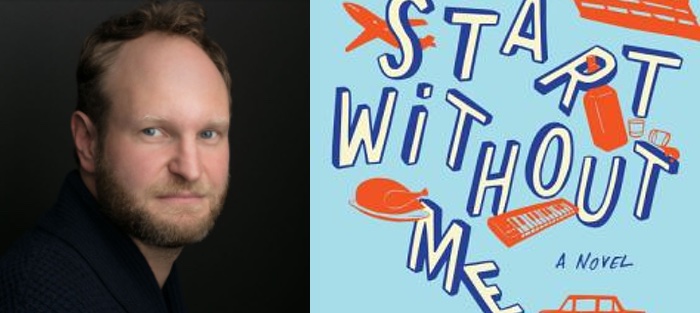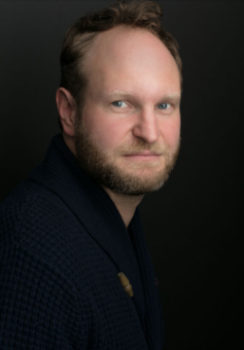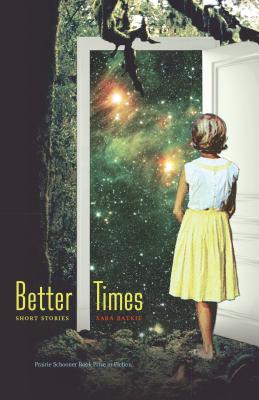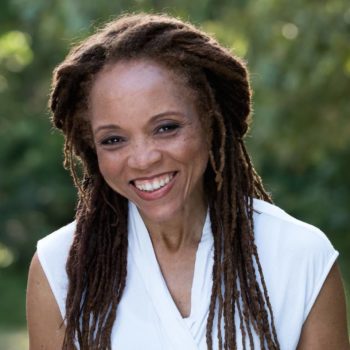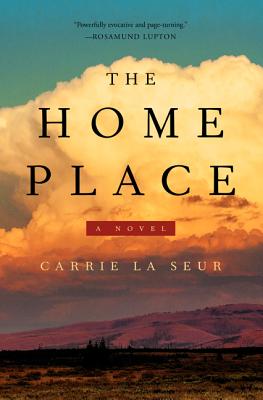I’ve known Joshua Max Feldman for over a decade, and he’s always been a fun guy to talk to. From his early days as a playwright to his success as a novelist with his 2014 debut The Book of Jonah (Henry Holt), Josh has always—as far as I’ve ever experienced—had a knack for engaging with whatever is in front of him with thoughtfulness and good humor.
Those qualities are readily apparently in Start Without Me (William Morrow), his new book, which takes place entirely on Thanksgiving. It follows Adam, a former musician and recovering alcoholic trying to keep it together for a family visit, and Marissa, a flight attendant heading toward another awkward holiday with her husband’s family. I’ll leave the ways that these two stories intersect for the book, but it will resonate with anyone who’s ever had ambivalent feelings about the holidays, anyone who’s ever grappled with familial expectations (or had to lower their own), and anyone who’s ever spent time in the loneliness of airports or hotel lobbies.
A few weeks before Thanksgiving, we sat down to talk about his writing process, the limits of perfectionism, the book’s sense of New England, and rock music.
Interview:
Jesse Hassenger: The book is called Start Without Me, so I’ll start with starting. When you were first working on this book, did it start with the characters, the story, Thanksgiving . . . ?
Joshua Max Feldman: I was doing some traveling for my previous novel, The Book of Jonah. During that travel, I was in hotel rooms often, and just thinking about anonymous corporate spaces—places everyone passes through like lobbies, airports, and hotel rooms. And the original idea for the novel was, it was going to be two characters who meet in a hotel lobby, they go upstairs to a room, they spend the night together, and that was going to be the whole book. That’s how it started, and it improved from there. I’d also been thinking about a story about a guy who’s home for a holiday or spending a weekend with his family, and he’s kind of a black sheep and not fitting in. And those ideas merged and came together and that’s what became the novel. A lot of times I’ll start with what I think is a short story—I always tell myself that I’ll write something short that I can finish quickly, and it’ll be really good, and then five years later . . .
Always trying to write it like a punk song.
Exactly. This time, I’m just going to bang it out. Then a year later I’m just getting started.
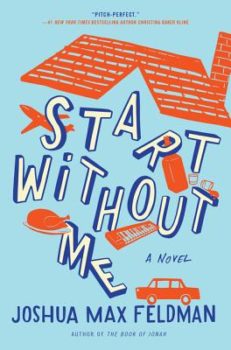 You mentioned Thanksgiving. I really like that the book is set at Thanksgiving—I feel like it’s the agreed-upon All-American holiday. So there’s a contrast in this, because Thanksgiving is a very reunion-heavy holiday, and this is about two characters who don’t know each other. It’s almost the last time you’d expect to meet a new person. So I’m curious about how that came about—how you wind up putting these two characters together?
You mentioned Thanksgiving. I really like that the book is set at Thanksgiving—I feel like it’s the agreed-upon All-American holiday. So there’s a contrast in this, because Thanksgiving is a very reunion-heavy holiday, and this is about two characters who don’t know each other. It’s almost the last time you’d expect to meet a new person. So I’m curious about how that came about—how you wind up putting these two characters together?
I should say, my Thanksgivings are really benign. Great, but not interesting, because everyone gets along.
I kind of assumed based on knowing you that this wasn’t taken from your own Thanksgiving, but I was curious.
Yeah, we noticed a couple of years ago, we go to my parents’ house, my cousins and aunts and uncles, and we’ve never had a fight at the table. Which is great! But I think part of the reason I wanted to write a book with a lot of family tension was that I was interested in that drama, having never experienced it. And it’s much more interesting to write unhappy stuff than happy stuff.
As far as strangers go, I think it’s interesting to look at characters who don’t feel comfortable in the settings that everyone else finds comfortable. That’s really Adam: all the domestic stuff, the routines, and the niceness . . . that just really rubs him the wrong way. Which I think is totally fair and legitimate.
And I think it’s relatable, too. A lot of people probably feel that way but are maybe better at bearing down and getting through it.
Exactly. He’s a character who has no capacity to grit his teeth and go, OK, I’ll just go along. Something in his mind just starts throwing grenades in those moments. And unless the holidays are going really well for you, they’re often kind of depressing—you really feel the absences in your life around the holidays. The stuff you don’t have. For both these characters, Adam and Marissa, they both have people in lives, but no one really fully knows them. That’s what really pulls them to each other, having these secrets and these things they can’t talk about.
Another thing I really liked about the book is the voices of the characters, dialogue-wise. That can be so hard to do, to make characters sound distinct in a way that’s not super broad. Adam and Marissa have very different ways of talking, Marissa’s mom has a very different way of talking, and my favorite, Laila (Marissa’s sister-in-law), has a very distinct way of talking. I couldn’t tell if you really nailed the speech patterns for Laila’s age group, or if you were just making fun of an age group I was really enjoying. But it read very natural to me.
Her voice was the easiest for me to capture. For me, physical descriptions of anything are very hard for me to write. What you put in a room, how you place a reader in the room, all those details . . .
How you work in what someone looks like, even, I always hate that.
It’s so hard! And you read other writers and it’s so effortless! It just doesn’t come naturally to me. Dialogue, on the other hand, is something I’ve always felt like I knew: the way people talk, and the rhythms in which they talk. That’s always come more naturally. I think some of that is that I have a background in theater, where I originally started out. The dialogue stuff is the most fun for me. Because of the musicality, you get do a little bit of music in the book, and it’s easier to be funny in dialogue.
Totally. If I could write only in dialogue, I’d be so happy.
If only there was some giant industry, where only dialogue was required!
Talking about musicality, I think that’s a good time to bring up music in the book. Adam is an ex-musician, and he doesn’t play a lot of music during the book, but there are a lot of references. I’m always interested in how writers decide on those, which bands get the name-drop—just as one example, he has a Wu Tang mix. From what I know about your music tastes, it didn’t seem like it was just you repeating your favorite bands.
No, definitely not that. It’s hard, because Adam knows so much more than I do about music, and he’s very gifted as a musician, and I imagine him as a character who knows every band, every album, every influence. So that was a big part of it. Also, I’m really jealous of musicians, because what they do is really awesome. Like what you were saying about writing a punk-rock song—it can seem so spontaneous and so easy. Obviously it’s not for most musicians, but being able to pick up your guitar and do your thing is really appealing. So that was part of it, wanting to include characters who speak that language. Part of that is envy, and part of it is that it’s really cool.
And I think you have a good sense of it, when you’re describing what it’s like for Adam to make music with his former partner—of the combination of skill and spontaneity.
I tried to be fair, because when you look over the fence it seems so easy, but I’m sure a lot of music-making is like writing, taking it one step at a time, making mistakes, fixing them . . . they don’t call it editing, but that’s a big part of it. But another thing that’s cool about music and is part of what the book is about is the interaction is so immediate. When you’re performing it for a group of people, you’re right there and it’s all happening at the same time. With writing, your experience is so removed from the reader in time and space. You’re not sitting there and watching them chuckle.
No, you’re not, and selfishly, I’m like, Can I just occasionally get some applause while I’m doing this?
Musicians in the moment are feeding off the energy of the crowd, and that is a really cool way to make art.
Did you have thoughts about what Adam’s old band sounded like?
That was hard for the reason that I don’t really know that much about music, and then I was like, Well if I had a band, what would my band sound like? This band was from the mid-2000s, so I thought about Mates of State. Magnetic Fields, on the early albums—that’s how I pictured [her] voice. I think a more crafty writer would be like, Their sound is what my prose aspires to do, so there’s synchronicity, but . . .
I was picturing bands when I was reading the descriptions, so I think it worked, even if you’re not describing the exact sound. I was picturing like, Cults.
Sure! I wrote a play years ago, and there was a singer-songwriter in there who was really consciously modeled on Fiona Apple. It was sort of my wanting to hang out with Fiona Apple was a big part of the play’s genesis. But that seemed not the right choice for this.
It’s not the Fiona Apple book.
Though as I think about it now, I feel like she’s become a figure in pop culture who only gets more interesting. As her career gets weirder, and the stuff around her career gets weirder, I feel like there’s a lot to be said about Fiona Apple. Did you ever read that New York magazine article where the writer goes and hangs out with her, and they get high, and they form this bond?
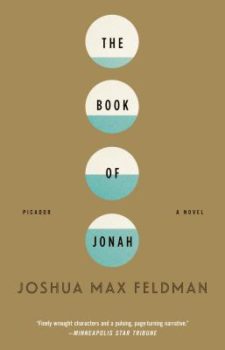 It’s funny that you say that because around the time of that album that came out around then was when I felt like she crossed the line where I was like, OK, I think maybe you’re smoking too much pot. The way the record came out, I felt like it started curling back in on itself. It’s a good record, but it’s harder for me to deal with.
It’s funny that you say that because around the time of that album that came out around then was when I felt like she crossed the line where I was like, OK, I think maybe you’re smoking too much pot. The way the record came out, I felt like it started curling back in on itself. It’s a good record, but it’s harder for me to deal with.
I guess in that vein, self-indulgence always works for me: the weirder the better, and doesn’t all hang together, you take some weird risks and I’m cool with it. I’m sure there’s some exception I can think of, but the rough edges are always appealing to me. I just read this book about the Beatles, and I was just realizing that for a lot of people, mid-career stuff like Revolver and Rubber Soul are the great Beatles albums. Whereas I really prefer the White Album. It’s kind of a mess, and it doesn’t all hang together, and I don’t know, I like that there are songs that are terrible and songs that are awesome.
Totally. The White Album is way better for me. I think it’s also when you come to it. I came to it when I was 14 or 15, and it was like the first genuinely strange music, and skillfully strange music, I’d heard and it felt more valuable to me than some of the others in that respect.
Like with the punk rock thing. Paul McCartney saw a certain value in pushing it out there. It’s done, it’s recorded, let’s go. With writers, you polish and you polish and you polish until you’re crazy.
My wife had a class with Alexander Chee and he said something about how writing longhand, you access your spontaneous intelligence, and I like that idea. It also weirdly appeals to my laziness, in that I like to be able to do things fast.
There’s a certain virtue to laziness. I think perfectionism is a worse quality than laziness. You’re gonna do the work, but you can’t do it forever. You have to move to something else.
There’s one more music thing I’m going to ask. I think The Book of Jonah had a Hold Steady reference in it, and then I could’ve sworn when I was reading Start Without Me . . .
Well, there’s a [Hold Steady pre-cursor] Lifter Puller reference because he’s wearing a Lifter Puller t-shirt.
I thought there was a lyrical reference, too, but I might have just been seeing things in the new one, because I know you love the Hold Steady.
I’d say I owe it to my core fan base, but I don’t have one, so I just owe it the previous iterations of myself to always have a Lebowksi reference, a Star Wars reference, and a Hold Steady reference.
Wait, what’s the Big Lebowksi reference? I missed it. I don’t mean to put you on the spot, though.
It’s some throwaway line . . .
About tying the room together?
Something like that. Some very innocuous line that’s in the movie. And I think someone mentions Star Wars explicitly. Because I wanted to write novels for so long, and had these ideas about what I would do if I did write a novel, I wanted to be true to that original idea. It’s also an acknowledgment of things I’ve loved and enjoyed over the years. So thank you for noticing it and finding it. I’ll probably keep doing it. It’s very satisfying. Now I’m wracking my brain trying to figure out what the Hold Steady reference in the book is.
It might have just been a phrase that was similar to a Craig Finn turn of phrase. You start absorbing these things. I’ve had to stop myself from using the Craig Finn modifiers—stuff like “It’s pretty alright,” you know? It’s hard not to do, because they’re a very literate band. It’s like reading short stories while you’re listening.
Exactly. Where do you think they are in the stratosphere of bands, in terms of reputation?
I think they’re well-regarded, but I think there’s now a feeling—and our mutual friend Ben has said something like this because so much of their music is about nostalgia—that it’s really about the first three albums, and after that, maybe not as much. I mean, some of their fan base is really fanatical, and probably loves every album as much as the previous one. I think I’m about 90 percent of the way to doing that. I love all of their albums. I don’t love Teeth Dreams or Heaven is Whenever as much as I love those first three. But like with my other favorite bands, I do learn all of their albums and love them kind of no matter how good they are.
That’s a good way to approach it. I’m going to love this, regardless of where it might rank; I really enjoy it, I love their work.
If you love a band where you even love the stuff that’s minor or inessential, that’s one of my favorite things about listening to music.
And then being surprised: “I thought everyone loved this! No?” It can drive you crazy being a fan, but it can also be really fun being a fan. There’s always that corner of fandom that’s all about drawing lines and boundaries. When did you get into a band, are you authentic . . .
That’s a very male thing, I think. “Do you even have whatever album?” when you’re talking to some girl wearing a band t-shirt who just wants to wear her damn shirt in peace.
I first came across that when Automatic for the People came out, and all the old R.E.M. fans were like, “Name three albums!”
And there aren’t that many musicians, and I’d say this is also true of film directors or writers, where I feel like their first one is the best. There are some—I’m sure there are some writers who had such amazing debuts that nothing else beats it. But A Visit from the Goon Squad, to pick a random example, that’s not Jennifer Egan’s first book. I think a lot of talented people tend to work up to these things. Was this a different process, writing the sophomore book?
I definitely knew a lot more this time. A lot of the first book was learning how to write a novel, and writing it, versus knowing how to do it and writing another one. You don’t want to listen too much to feedback, but there’s some course correction, and the way people respond to things is surprising. I guess it’s like this: you learn a bunch of tricks as a writer, and then you get better at certain things, and it becomes more like, how do I deploy what I know how to do? The whole thing is a very strange process. But that’s what’s great about it, because it’s always very challenging. This is something that’s never going to feel easy, which makes it worth doing.
Yeah. I write movie reviews, and I feel like I got good at those. But with fiction writing, I never feel like, Oh, now I’m really good at this.
Or you read someone who’s doing it in this way you didn’t think it could be done. I think there’s a lot of cool, interesting fiction being written now.
Do you have writers you feel are unsung that feel especially passionate about?
I mean, everyone’s unsung at this point, because so few books penetrate. Manhattan Beach has kind of gone outside book circles.
And that was on the back of a book that won a Pulitzer and was a work of genius.
Yeah, the sequence is really important—the right book at the right time. I feel like Marilynne Robinson is unsung. I really love her. But I think every year, more great books come out than you can read. That’s really cool.
“Reading: Now more than ever.”
Exactly. I also think it’s nice to be able to read something that someone put time and effort into. You can push “content” quickly, and there’s something to be said for that. But there’s something to be said for reading something where the writer sat with it for a very long time.
Half of Start Without Me is from a female point of view. Did you find it more difficult to access or is it all kind of the same thing?
I guess I should say I find it more difficult, but I just try to think of the character and the circumstances—I approach it the same way. I also think that female characters are interesting to me in a way that male characters are not. Maybe it’s that familiarity, understanding what a male character who grows up roughly the way I did would approach different situations. Whereas with women, because it’s less familiar, it feels more creative and more fun. I really enjoy writing female characters. That’s one of the best things about fiction: crossing these walls and asking what this character’s experience is like.
Did you talk to any flight attendants?
Yep. Someone asked me at a reading, what’s the most interesting thing you learned about being a flight attendant?
Get this: they’re human beings.
Yeah, it’s a job. Their job involves riding in an airplane every day, and it seems very exotic to us, but it’s very much a workaday thing that has its upsides and downsides. I tried in the book to portray the unfairness of it: you’re at the bottom of a machine, and you’re as much a victim of the machine as the passenger. They assume you have all this control, but when you’re sitting on the tarmac stuck, no one wants to be in that situation. Let me see if I can get this right: There’s some detail where they don’t start clocking your hours until the door closes on the plane. If you’re stuck at the gate and the door hasn’t closed, the clock isn’t running on their hours. Remember the guy that jumped out of the JetBlue plane?
Yes. He was doing what everyone who’s ever been on an airplane has dreamed of doing! Speaking of travel, this book is super New England-y! There’s the Vermont country house in Brattleboro, Bradley Airport in Connecticut, Marissa’s mom has that Southie Boston vibe. You’re from New England, right?
Western Massachusetts, yeah.
You do kind of a comprehensive tour. No New Hampshire, though.
No New Hampshire. You can’t go everywhere. At one point, they went up to Maine, but the geography of it was too complicated. But I think Maine is mentioned.
So I was interested in your thoughts on growing up in New England how that affected the book.
Well, you get a really strong Thanksgiving experience, because you really feel the fall season—the temperature and the change in the leaves and all that, and also that’s where Thanksgiving started. So it made a lot of sense to me to put a Thanksgiving novel in New England. I think it’s also fun to recreate the places you are familiar with. So much of the novel is driving up and down I-91 and I have so many experiences of doing that as a kid, and it’s nice to be able to recreate that stuff. You’re kind of giving it a hug and sharing it with people and honoring it, saying this is worth telling other people about. I like writers who have reverence for certain places. Marilynne Robinson has so much reverence for Iowa—it means so much to her.
Do you think that feeling comes out more, living in New York? I feel like as much as I love New York, it makes me want to write about places that aren’t New York.
Definitely. New York is so all-encompassing, and you start to forget there are other places that are completely different from New York. It’s not nostalgia, exactly, but it’s nice to remind yourself that there’s another way to organize a large group of people besides all the pavement.

